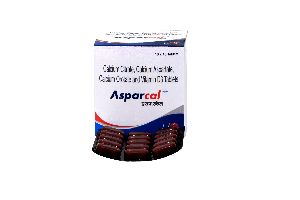
Calcium Citrate, Calcium Aspartate Calcium Orotate and Vitamin D3 Tablets
165 Per Piece
Combination of three different organic molecules provides calcium largely in complex forms, Gets incorporated into bones directly through paracellular absorption, Vitamin D3 facilitates calcium absorption and high - density bone deposition.

Methylcobalamin Injection 2ml
Get Price Quote
Methylcobalamin is used to treat pernicious anemia and vitamin B12 deficiency, as well as to determine vitamin B12 absorption in the Schilling test. Vitamin B12 is an essential vitamin found in the foods such as meat, eggs, and dairy products. Indications and Usage: Methotrexate is used to treat certain types of cancer or to control severe psoriasis or rheumatoid arthritis. It may also be used to control juvenile rheumatoid arthritis. Methotrexate belongs to a class of drugs known as antimetabolites. It works by slowing or stopping the growth of cancer cells and suppressing the immune system. Early treatment of rheumatoid arthritis with more aggressive therapy such as methotrexate helps to reduce further joint damage and to preserve joint function. Storage Conditions: Store it at room temperature. Key Feature: WHO-GMP Certified Packaging can be customize Hygienically packed Balanced composition Stability Highly effective
Best Deals from Dietary Supplements

Flaxseed Oil Capsules
1,499 Per Pack
Details : Flax is a food and fiber crop that grows in Europe, Asia, and the Mediterranean. Flaxseeds are the golden yellow to reddish brown seeds of flax. These seeds contain phytoestrogens, which are similar to the hormone estrogen, as well as soluble fiber and oil. Flaxseed oil contains the essential omega-3 fatty acid alpha-linolenic acid (ALA). Flaxseed has been eaten as a food or used as a medicine since 5000 BC. People use flaxseed by mouth for constipation, colon damage due to overuse of laxatives, diarrhea, inflammation of the lining of the large intestine (diverticulitis), irritable bowel syndrome (IBS) or irritable colon, sores in the lining of the large intestine (ulcerative colitis), inflammation of the lining of the stomach (gastritis), and inflammation of the small intestine (enteritis). People also take flaxseed by mouth used for disorders of the heart and blood vessels, including heart disease, high triglyceride levels, high cholesterol, "hardening of the arteries" (atherosclerosis), high blood pressure, coronary artery disease, and metabolic syndrome. Flaxseed is also taken by mouth for acne, attention deficit-hyperactivity disorder (ADHD), kidney problems in people with a disease called systemic lupus erythematosus (SLE), liver disease, symptoms of menopause, breast pain, diabetes, prediabetes, obesity and weight loss, HIV/AIDS, depression, malaria, rheumatoid arthritis, sore throat, upper respiratory tract infections (URTI), and cough, bladder inflammation, enlarged prostate, osteoporosis, and to protect against breast cancer, endometrial cancer, lung cancer, colon cancer, and prostate cancer. It is also taken by mouth to prevent problems associated with hemodialysis treatment. Flaxseed is sometimes applied to the skin for acne, burns, boils, eczema, psoriasis, and to soothe inflammation. Flaxseed is used in the eye to help remove debris from the eye. How does it work? Flaxseed is a good source of dietary fiber and omega-3 fatty acids. The fiber in flaxseed is found primarily in the seed coat. Taken before a meal, flaxseed fiber seems to make people feel less hungry, so that they might eat less food. Researchers believe this fiber binds with cholesterol in the intestine and prevents it from being absorbed. Flaxseed also seems to make platelets, the blood cells involved in clotting, less sticky. Overall, flaxseed’s effects on cholesterol and blood clotting may lower the risk of “hardening of the arteries” (atherosclerosis). Flaxseed is sometimes tried for cancer because it is broken down by the body into chemicals called “lignans.” Lignans are similar to the female hormone estrogen - so similar, in fact, that they compete with estrogen for a part in certain chemical reactions. As a result, natural estrogens seem to become less powerful in the body. Some researchers believe that lignans may be able to slow down the progress of certain breast cancers and other types of cancers that need estrogen to thrive. For systemic lupus erythematosus (SLE), flaxseed is thought to improve kidney function by decreasing the thickness of blood, reducing cholesterol levels, and reducing swelling. Uses & Effectiveness?Possibly Effective for : Diabetes - Taking flaxseed might improve blood sugar control in people with type 2 diabetes. Benefits seem to be greatest with whole flaxseed and when used for at least 12 weeks. Flaxseed also seems to work best in people with type 2 diabetes that is not well controlled. High cholesterol - Research shows that various flaxseed preparations, including ground flaxseed, partially defatted flaxseed, flaxseed extract, and flaxseed bread and muffins, seem to reduce total cholesterol by 5% to 15% and low-density lipoprotein (LDL or "bad") cholesterol by 8% to 18% in people with normal cholesterol levels, as well as in men and pre-menopausal women with high cholesterol. However, there is some conflicting evidence. Some research shows that flaxseed does not improve LDL cholesterol levels in postmenopausal women with normal or high cholesterol. It also does not seem to decrease total cholesterol or LDL cholesterol in people with mildly high cholesterol compared to following a cholesterol-lowering diet. Also taking flaxseed daily for 4 weeks in muffins and breads does not reduce total or LDL cholesterol in children with a family history of high cholesterol. The differences in effectiveness might be related to the form of flaxseed used as well as variations in the severity of cholesterol levels in the people studied. High blood pressure - Research suggests that taking flaxseed can reduce blood pressure. Also, eating milled flaxseed in bread daily for 6 months seems to reduce blood pressure in people with narrowed blood vessels and high blood pressure. Breast pain (mastalgia) - Research shows that eating a flaxseed muffin daily for 3 months or taking flaxseed powder daily for 2 months reduces breast pain associated with the start of the menstrual cycle. Autoimmune disorder (systemic lupus erythematosus, SLE) - Taking whole or ground flaxseed by mouth seems to improve kidney function in people with SLE. Weight loss - Taking at least 30 grams of flaxseed per day for at least 12 weeks seems to help reduce body weight, body mass index (BMI), and waist size in adults. Flaxseed seems to work best in people who are moderately overweight or obese before treatment. Possibly Ineffective for : Osteoporosis - Research shows that consuming 40 grams of ground flaxseed daily for up to one year does not improve bone density in women. Similar findings were found for older men and women who took flaxseed extract.Insufficient Evidence for : Enlarged prostate (benign prostatic hyperplasia; BPH) - Early research shows that taking 300 to 600 mg of a specific flaxseed product (BeneFlax, Archer Daniels Midland Co., Decatur, IL) daily for 4 months reduces urinary tract symptoms associated with BPH and improves quality of life. Breast cancer - Early research shows that eating a muffin containing 25 grams of ground flaxseed daily for about 40 days reduces tumor cell growth in women recently diagnosed with breast cancer. However, it is unclear if this effect significantly improves overall breast cancer outcomes. Also, there is inconsistent evidence regarding the effects of dietary flaxseed on breast cancer development. Heart disease - Population research suggests that dietary intake of lignans, which are found in flaxseed and other foods, does not reduce the risk of heart disease. Colorectal cancer - Research on the effect of flaxseed on colorectal cancer risk is inconsistent. Some research shows that consumption of lignans, which are in flaxseed, is not associated with a reduced risk of colorectal cancer. However, other research suggests that it is. Constipation - Flaxseed is a good source of dietary fiber. Eating flaxseed-containing muffins seems to increase bowel movements in young adults, while eating yogurt containing flaxseed, prunes, and a specific galacto-oligosaccharide (Elixor, Borculo Whey Products, the Netherlands) seems to increase bowel movements in elderly people. But it's not clear if these effects are from the flaxseed or other ingredients of these products. Endometrial cancer - Research suggests that blood levels of lignans, which are found in flaxseed and other foods, are not associated with endometrial cancer risk. A treatment for kidney failure called hemodialysis - Hemodialysis often results in abnormal cholesterol levels and inflammation. Early research suggests that taking ground flaxseed twice daily for 8 weeks during hemodialysis reduces total and low-density lipoprotein (LDL or "bad") cholesterol. Flaxseed also seems to reduce inflammation in people on hemodialysis. Irritable bowel syndrome (IBS) - Early research shows that taking 24 grams of whole or ground flaxseed daily for 4 weeks does not improve quality of life or the severity of symptoms in people with IBS. Lung cancer - Early research suggests that people who eat more phytoestrogens, such as those found in flaxseed, might have a lower risk of developing lung cancer than those who eat less. Menopausal symptoms - It is not clear if flaxseed works for reducing symptoms of menopause such as hot flashes. Some research shows that taking a specific flaxseed extract (Biogalenica, Medicinal Compounding Pharmacy) for 6 months reduces symptoms and hot flashes in postmenopausal women. Also, some research shows that consuming ground flaxseed reduces menopausal symptoms similarly to hormone therapy. But other studies show that it does not work any better than taking a sugar pill. The difference in effectiveness might be due to the dose of flaxseed used. Metabolic syndrome (a condition that increases risk for diabetes and heart disease) - Evidence on the use of flaxseed for metabolic syndrome is inconsistent. Early research shows that taking a specific flaxseed extract (BeneFlax, Archer Daniels Midland Co., Decatur IL) daily for 6 months reduces the risk of metabolic syndrome. But other research shows that taking flaxseed does not improve markers of metabolic syndrome in people also following lifestyle modifications compared to those who just follow lifestyle modifications. Liver disease (nonalcoholic fatty liver disease) - Early research shows that taking brown milled flaxseed daily for 12 weeks and making lifestyle changes can reduce the amount of fat and damage in the liver in adults with liver disease. Prediabetes - Early research shows that taking milled flaxseed daily does not improve blood sugar levels in adults with prediabetes. But flaxseed may lower systolic blood pressure (the top number) in adults with this condition. Prostate cancer - Early research suggests that taking ground flaxseed (Alena, Enreco, Manitowoc, WI) and following a low-fat diet can lower prostate-specific antigen (PSA), a marker for prostate cancer, in men who have a precancerous prostate condition. However, in men who have prostate cancer, adding flaxseed to the diet does not lower PSA, but it does seem to lower levels of the hormone testosterone and slow the rate at which cancer cells multiply. Acne. Attention deficit-hyperactivity disorder (ADHD). Bladder inflammation. Burns and boils. Damage to colon from laxatives. Diverticulitis. Eczema. HIV/AIDS. Scaly, itchy skin (psoriasis). Stomach upset. Skin irritation. Other conditions - More evidence is needed to rate of flaxseed for these uses.

Iron Side Table
2,850 Per Bottle
100 Piece (MOQ)

Iron Side Table
Get Price Quote
Sodium Glycerophosphate, Cyclophosphamide, Mebendazole, Telmisartan

Dietary Supplements
Get Price Quote
Dietary Supplements, Healthcare, Drugs, medicinal seeds, medicine packaging